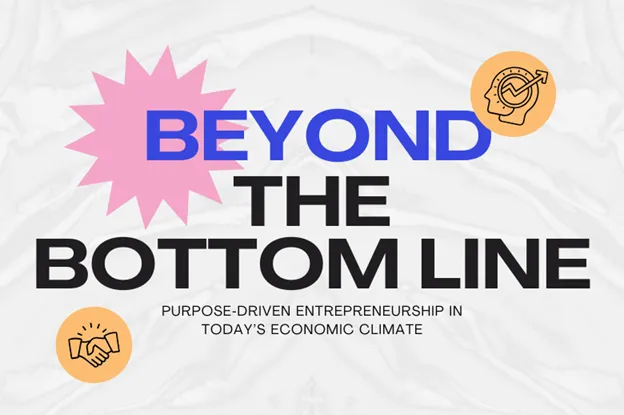
Beyond the Bottom Line

Purpose‑Driven Entrepreneurship in Today’s Economic Climate
As we enter the second half of 2025, purpose‑driven entrepreneurship has transitioned from niche to necessity. It is now both a moral journey and a powerful business advantage;helping companies to perform better, build trust, and last longer.
1. Purpose as a Strategic Differentiator
Purpose-led businesses are no longer a luxury;they’re essential. A multi-country study found that companies led by purpose-driven entrepreneurs were 13.4 percentage points more likely to pioneer new products or services (sciencedirect.com). This isn’t about image;it’s about innovation rooted in real-world impact.
Actionable takeaway:
Map your core mission to your offering. Could your next product serve an underserved community or solve a social issue? Build that into your roadmap for differentiation and resilience.
2. Investing with Intent: The Rise of Impact Capital
Capital has shifted. As 2024 closed, the impact investing market hit $1.43 trillion, with an annual 20% growth rate (grandviewresearch.com). Today, 60% of institutional investors include impact goals alongside financial returns (linkedin.com). The era of sacrifice in pursuit of purpose is over;today, ethical ventures earn trust and capital simultaneously.
Actionable takeaway:
In your next pitch deck, include an Impact Metrics slide alongside financial projections. If you can show measurable results;jobs created, emissions avoided, children served;you won’t just attract investors, you'll command higher valuations.
3. Economic Complexity Demands Purpose
Despite global growth grinding along at about 2.7%, pockets like India and Bangladesh are bucking the trend;guided largely by purpose-based SMEs (weforum.org,forbes.com). Meanwhile, rising costs and climate disruption highlight the need for agility.
Actionable takeaway:
Future-proof your business. Build scenario planning into your strategy. Ask: How can our purpose strengthen adaptability? Where can we pivot our mission in a crisis and still deliver?
4. Ecological Entrepreneurship Is Staying Power
Startups built on sustainability principles are proving more survivable;roughly twice as likely to remain thriving after 9 years . In today’s climate-conscious world, ecologically motivated businesses win on product, purpose, and profit.
Actionable takeaway:
Review your supply chain sustainability. Can you shift to recycled materials or a circular model incrementally? Highlight this evolution in your marketing;it resonates with eco-conscious stakeholders.
5. Authentic Purpose Integration
Purpose only works when it’s real. Harvard research shows ESG practices contribute positively to financial returns in 90% of cases . But authenticity matters: half-baked ESG efforts get called out. The Berkeley “purpose transformation” roadmap advises embedding impact into processes;not just messaging (cmr.berkeley.edu).
Actionable takeaway:
Conduct a “Purpose Audit”: review your operations, HR, marketing, and supply chain. Highlight one area this quarter where purpose can deepen;then communicate steps internally and externally.
6. Digital Tools Amplify Purpose
Entrepreneurs are using digital tools;AI, blockchain, and data;to measure impact in real time. Research indicates 73% of VCs now weigh social metrics equally with financials (empiremagazineafrica.com). Ready access to data builds transparency and trust.
Actionable takeaway:
Use a basic dashboard (Google Sheets works) to track at least three purpose KPIs monthly (e.g., women employed, CO₂ saved, educational outcomes). Show this during meetings or presentations to signal accountability and strategic clarity.
7. Purpose Powers Talent and Culture
Purpose-driven teams stay longer. Deloitte indicates purposeful organizations see 27% lower staff turnover (forbes.com). For Millennials and Gen Z employees, passion and values now outweigh paychecks .
Actionable takeaway:
Include an “Impact Story” in your hiring narrative. Highlight one past initiative where purpose shaped your culture. Use it in job posts and interviews to attract aligned talent.
8. Collaboration as Scale Strategy
The World Economic Forum and other global bodies emphasize that purpose-led entrepreneurs benefit from partnerships. Impact-focused alliances across sectors are up 30% in five years .
Actionable takeaway: Identify one strategic partner;be it NGO, corporate, or institution;and explore a pilot collaboration before year-end. A joint purpose initiative can jump-start trust and new market entry.
9. Leadership Recalibrated for Impact
Purpose is reshaping leadership. Leaders now need empathy, inclusion, and transparency. A growing wave of entrepreneurs are adopting “servant leadership” to both empower teams and elevate impact .
Actionable takeaway:
Start a monthly “Listening Circle” with your team;ask one question like “Where do you see us living up to our purpose? Where can we improve?” Use feedback visibly and thank your team for it.
Why AMCOB Matters Now
At AMCOB, the purpose isn’t marketing;it’s foundational. Across our Peer Advisory Groups, Corporate Allyship initiatives, and Muslim Lynk networking tools, we enable entrepreneurs to integrate mission and impact into growth.
You aren’t chasing trends;you’re anchoring your leadership in values. As impact becomes currency, AMCOB equips you to lead with intentionality and influence that transcends profit.
Purpose-driven entrepreneurship is today’s advantage; both morally and economically. It spurs growth, reduces risk, attracts investors, fuels talent, and builds resilience.
You don’t have to choose between profit and purpose. Purpose is the edge that turns great businesses into generational platforms. That’s the future;and it starts with each deliberate decision you make now.

